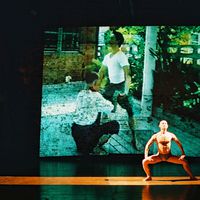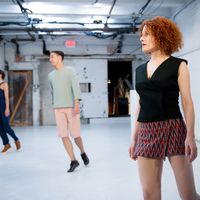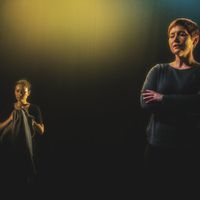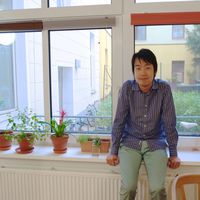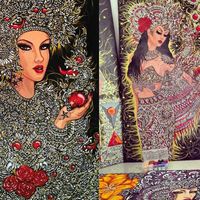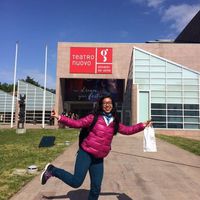First Ever Atelier for Young Festival Managers in Singapore!

After a week of intensive workshops and discussions, I am attempting to put into words what an incredibly inspiring and transforming experience it has been for me to attend the Atelier for Young Festival Managers in Singapore.
The Atelier is a one-week intensive course for emerging Artistic Festival Directors and the whole experience has been set against the stunning backdrop of Singapore – a beautiful, tropical, vibrant city overflowing with cultural centres, art galleries, museums, theatre venues and concert halls. The Atelier has been brilliantly organised by the European Festivals Association (EFA) and is also supported by a number of key partners including the Asia-Europe Foundation (ASEF) and LaSalle College of the Arts who were the hosts of the Atelier. ,
I am very grateful and fortunate that my trip to the Atelier has been supported by the Asia-Europe Foundation, Arts Council England and the Huddersfield Contemporary Music Festival, and I had no idea at the start of the week how transformational this experience would become.
The week began with an opening ceremony on the centre green of the LaSalle College campus The schedule of the week was a mixture of presenting our papers to the rest of the group, discussing topics as a large group and breaking into smaller groups to look at issues in more detail – plus some of the world’s leading Festival Directors gave presentations and we attended panel discussions with the mentors and presenters of the Atelier.
The mentors (Hugo De Greef, Rose Fenton, Ching-Lee Goh, Nele Hertling and Grace Lang) and presenters (Robyn Archer, Norman Armour, Seok Kyu Choi, Bernard Faivre d’Arcier, Wai-Lap Kwong and Carla van Zon) are incredibly inspirational individuals with more than impressive CVs and a wealth of experience.
We also attended a range of events hosted by a number of major arts organisations here, including Theatreworks, the Singapore Arts Museum and the Esplanade Theatres on the Bay. (a 600 million dollar venue which occupies six hectares of waterfront land alongside Marina Bay to the east of the Padang, boasting a concert hall, theatre, recital and theatre studios, a wide gallery space and an auditorium – plus it has a shopping mall around it)!
 We saw a performance of When a Gray Taiwanese Cow Stretched by Japanese writer and director Yukichi Matsumoto, with his award winning company Ishinha, as part of the Singapore Arts Festival. The stage, set and auditorium were built outside in the grounds of the Esplanade and surrounded by the Festival village area, a buzzing social area with bars and wooden stalls all around. The performance contained very detailed choreography on an epic scale and Jan Jan Opera language, a kind of Osaka street rap. Yukichi Matsumoto has worked a lot in film and this really showed – I had to keep reminding myself to look at the stage as a whole and not get dragged into the detail of individual movements, to really appreciate the full visual effect. I found it a mesmerising, visually stunning performance and I really enjoyed the music created by Matsumoto’s long time musical collaborator Kazuhisa Uchinahashi.
We saw a performance of When a Gray Taiwanese Cow Stretched by Japanese writer and director Yukichi Matsumoto, with his award winning company Ishinha, as part of the Singapore Arts Festival. The stage, set and auditorium were built outside in the grounds of the Esplanade and surrounded by the Festival village area, a buzzing social area with bars and wooden stalls all around. The performance contained very detailed choreography on an epic scale and Jan Jan Opera language, a kind of Osaka street rap. Yukichi Matsumoto has worked a lot in film and this really showed – I had to keep reminding myself to look at the stage as a whole and not get dragged into the detail of individual movements, to really appreciate the full visual effect. I found it a mesmerising, visually stunning performance and I really enjoyed the music created by Matsumoto’s long time musical collaborator Kazuhisa Uchinahashi.But perhaps the highlight of my week artistically was a performance the following evening by Uchinahashi (the composer himself) on the guitar, Timothy O’Dwyer (saxophones) and Darren Moore (percussion) at the Blu Jazz Club. Exploring the outer reaches of contemporary improvisation, this raw, pulsating, extremely loud, and occasionally tender and sensitive music literally blew my mind.
I’ve been very privileged to see and hear these wonderful performances, and experience the surroundings of this tropical city – the music, the theatre, the visual art – but the core of the Atelier, the real centre of this experience, has been the long full days of intense and illuminating discussions with our mentors and presenters – this is the Atelier experience at its best.
We have talked non-stop about the realities and pressing issues of what it is to programme art in the 21st century including:
- the role of Festivals in our societies, as celebrations, as vehicles for social and political change and as a way to offer enlightening and challenging experiences to people
- the challenges of programming, including how to commission, the pros and cons of using themes, financial and political barriers and how to overcome them
- definitions of ‘contemporary’ and ‘traditional’ work (a hot topic in this global context, but particularly for the Asia region given the differences in the traditions and canons here to other parts of the world), and what this means on different continents, for different art forms and different generations
- how to engage the audience while respecting the work and the artists (including the differences in audience behaviour across different community cultures and areas of the world)
- how to develop and protect younger and emerging artists whilst putting them on a stage alongside international, world-class work
- as the language we use to describe ‘programmers’ and ‘curators’ changes and evolves how does this reflect the role of the Artistic Director and does the function of this role also change?
 A significant value of the Atelier for me personally has been the chance to meet people who live and breathe artistic Festivals, from all over the world. I have enjoyed having my stereotypical assumptions of the world (seen through a prism of western media information) broken down, and I am so grateful for the opportunity to begin developing a greater understanding of other people, continents, cultures and viewpoints.
A significant value of the Atelier for me personally has been the chance to meet people who live and breathe artistic Festivals, from all over the world. I have enjoyed having my stereotypical assumptions of the world (seen through a prism of western media information) broken down, and I am so grateful for the opportunity to begin developing a greater understanding of other people, continents, cultures and viewpoints.I have realised that my view of ‘music’ or theatre’ or ‘dance’ as an art form is very narrow and only really encompasses a European view of each art form and their canon. The Atelier experience has inspired me to dig deeper into the arts and discover the wealth of work that exists and is being created across the world, plus the different histories of the arts, that exist across the continents and the contexts these create for contemporary work.
There are Festival Managers working in countries where there is no arts policy at a national government level and no recognition of the importance of the arts to people and society. In some countries there are no formal mechanisms in order to access funding. Hearing the challenges and successes of each person on the course has been both illuminating and inspiring. I hope that my experiences and the story of the Huddersfield Contemporary Music Festival (hcmf//) has been as helpful and interesting to the other participants as their projects and situations have been to me.
I have made some friends for life here and as a result of the Atelier we have created a network of young programmers and festival producers (the International Festival Circle) from across the world that will go forward to create work together and continue to communicate with their worldwide colleagues via Facebook, Skype and by visiting each other around the world!
Born in 1980, composer Nikki Cassidy studied with international composers Professor Christopher Fox (at the University of Huddersfield) and Professor Martin Butler (at the University of Sussex). Cassidy's music revolves around encouraging and drawing sound into existence. The notion of communication between the composer, artists and audience is a significant part of her work and she also 'makes' some of her scores on canvas. Cassidy has worked for a range of arts organisations including Sussex Arts Marketing and the Barbican Centre in London. Since May 2006 she has been Festival Producer at the Huddersfield Contemporary Music Festival (hcmf//), the largest festival of new music in the UK. This year’s hcmf// runs from Friday 18 – Sunday 27 November 2011.

